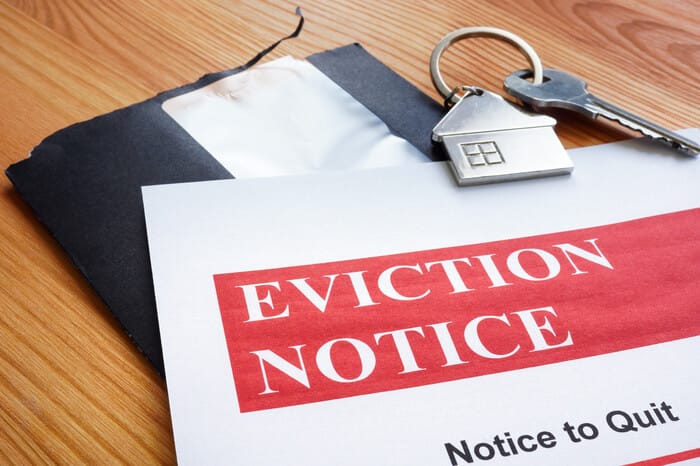Airbnb Squatters: How to Spot the Warning Signs and Protect Your Business

Evicting Airbnb squatters is a time-consuming, stressful process. It’s best that you educate yourself about how you can prevent having to remove guests from your Airbnb rental property. Find out which red flags you shouldn’t ignore.
Although it doesn’t happen often, Airbnb squatters can be a huge inconvenience. Not only do they disrupt business, but they also become costly if you have to seek legal advice. Plus, after you have successfully removed Airbnb squatters, you might still need to deal with property damage—another potential added expense.
Because of this, it’s best to have a plan in place to prevent squatters from booking your property in the first place.
What Is an Airbnb Squatter and How Can I Spot Them?
In short, an Airbnb squatter is a guest who fails to check out after their checkout date. In other words, they do not vacate the property when they’re supposed to leave and knowingly and willingly overstay their welcome without the permission of the host or property owners.
As a matter of fact, many of them are sophisticated scam artists. They know how to use the local laws to their advantage.
Here are three of the most common warning signs that could indicate an Airbnb guest has plans to squat at your vacant rental property:
They have a questionable guest profile
Red flags that you’re dealing with potential squatters include:
- Missing, fake, or blurred Airbnb profile pictures
- Missing fields in their Airbnb bio
- Bad reviews from another Airbnb host
- A profile that was created just before they made the booking
Basically, you ideally want to rent out to guests who have completed more than just the required basic information. Even better, if it’s not their first booking and they have a few reviews that you can use for guest screening.

They’re hesitant to give you important information
Your prior communication with interested guests can give you many clues too. If they are quick to reply to your questions, it is usually a good sign.
Red flags include if they refuse to give you extra information about their booking details that can be used for guest screenings and credit checks (like their ID) or if they object to signing a vacation rental contract.
At the end of the day, vacation rental owners need to listen to their gut. Has the guest said anything (or left something out) that has made you feel uneasy?
They want to stay longer than 30 days
It can be appealing to rent out your apartment for extra long periods. However, in the United States, most states make a clear distinction between tenants and short-term rental guests. The squatters’ rights that a guest has could become much greater and trickier when they stay at your property for more than 30 days.
In some cases, like in California, it could be as little as 14 days. Here, a guest becomes a tenant after only 14 days in six months, or seven consecutive nights. When this happens, the state’s landlord-tenant laws apply and eviction protocol will have to be followed if guests refuse to leave.

How Can I Protect My Business and Avoid Airbnb Guests Who May Be Squatters?
Implementing general Airbnb safety tips that you would normally do to protect your short-term rental business can also help to prevent squatters from becoming your next (and possibly last) guest. The following are examples of the practices you need to prioritize:
Screen and verify your Airbnb guests
Firstly, you should only accept bookings from verified guests on Airbnb. Verified Airbnb guests will have a red, identity verified badge with a checkmark displayed next to their profile photo.
Then, you should take the time to read the reviews written by other Airbnb hosts about the guest’s previous stays. Most of the reviews are pretty accurate and can be a valuable resource that you can use in addition to other verification methods.
It can also be a good idea to use guest screening tools like safely.com that can help you to screen guests. In short, safely.com offers a comprehensive guest screening service that screens for convicted felons. What’s more, they also have a database of guests whose negligence resulted in property damage. Every guest will also be screened against this list.
Last, you should also look for any red flags, as mentioned earlier, on the profiles of prospective guests. You can even extend your search beyond the profile they have created on the vacation rental platform. A quick Google search can reveal a lot, while social media like Facebook, Instagram, or Twitter can also be used to verify information that they have provided.

Ask your Airbnb guest to sign a vacation rental contract
Most hosts also ask their guests to sign a rental agreement. This extra step will give you more power and can be used to support your case in the event that you need to go through the eviction process and take legal action.
It is key that you highlight the check-in and checkout dates and times in your vacation rental agreement. Without this information, you could have a harder time proving that your guests, in fact, overstayed their welcome and that they were not given permission to stay longer.
Other important details that you can include in your vacation rental contract arehouse rules and arrangements regarding parties, noise, and extra guests.

Use trusted vacation rental platforms and software
Airbnb provides extra verification checks so it is safer to receive bookings via their platform. It also provides extra Airbnb host liability insurance which will only be granted for bookings made through the Airbnb platform. That being said, it is best to restrict your booking to 29 days at most, depending on your city’s restrictions.
To simplify and save time on the bookings process and improve communication regarding key information like dates and house rules, hosts can also use vacation rental software like iGMS. iGMS can help you to manage the following routine tasks with the help of automation:
- Managing multiple accounts and listings on the top OTAs from a single interface
- Synchronizing reservations across multiple platforms to eliminate the risk of double-bookings
- Organizing messages into a single feed with a unified inbox
- Improving communication with automated templates and triggered messaging
Get squatter insurance coverage
Irrespective of the risk of renting to an Airbnb squatter, all Airbnb hosts are strongly advised to spend a few extra bucks to take out additional vacation rental insurance. The extra money spent will give you the peace of mind that you’re protected against the risk of damage to your business. Considering that mid-term stays are on the increase, it is also a good idea to get a policy that specifically includes squatter insurance coverage.
For example, Proper Insurance has a custom-written policy to help hosts deal with Airbnb squatters. Their coverage includes a loss of business income of up to $10,000. They will also cover actual expenses of up to $5,000 that you had to incur in dealing with an Airbnb squatter. These could include legal fees, court costs, sheriff fees, and property damage.

Request a security deposit
Another way that you can reduce the chances of sitting with unwanted guests is to charge a security deposit. Most people looking to squat at a short-term rental do not want to pay a lot of money for their stay. In fact, they are probably hoping to pay nothing whatsoever. So, if you charge a security deposit (even more effective if the amount is slightly higher than average), you can make your property less attractive to squatters.
The Process and Challenges of Evicting Squatters
Call your insurer
If you have vacation rental insurance, it is important that you inform your insurance provider immediately. It could be that you might just be protected against this type of situation. In the case that your policy does include coverage, they still need to know about these events as soon as possible so that you can be covered for any losses.

Lawyer up and file an action as soon as possible
As most Airbnb squatters are actually sophisticated scam artists who have planned to occupy your property, it is key that you partner with a lawyer who is experienced at helping with eviction proceedings. There are two types of actions that can be filed: an action for possession or an unlawful detainer.
If a guest claims to be a tenant, these actions will help you to prove that no lease agreement is in place. Therefore, the guest has no right to stay on your property.
Understand squatters’ rights and short-term rental laws
Hosts need to know what squatters’ rights apply in their area. While it might sound strange, depending on your location, an Airbnb squatter may have certain tenant rights.
For instance, if the property owner does not evict them in time or take the right action, adverse possession laws could mean that they may inhabit or use the property and may have even laid claim to the title after a specific period of time has elapsed. The logic behind this law is to discourage the ownership of unused properties.
As the adverse possession laws differ from one state to the next, it is key that you familiarize yourself with your specific jurisdiction’s laws. Most states in the US, however, allow a guest to claim tenant rights after 30 days of occupation.
You can, for example, find the latest laws and regulations regarding short-term rentals in the US on Airbnb’s responsible hosting page. Here, they list general information about local regulations by city, county or region.
You can also visit the official website of your local government. As part of your short-term rental operations, make it a habit to check these pages from time to time to keep up to speed with regulatory changes.

Formally ask the squatter to leave
Hosts should take action by informing the Airbnb squatter that they do not have permission to be on the property and request that they leave. They need to do this as soon as possible to avoid complications from adverse possession law.
Keep a paper trail
When dealing with an Airbnb squatter, it is crucial that you have comprehensive documentation. You want as much evidence as possible to help prove your case, especially if the situation makes its way to court.
Make it common practice that you keep all documentation and communication for each guest. Keep it for a couple of months as it could be needed as evidence at some point (not just in the case of dealing with squatters but also for other incidents that could land you in legal trouble).
This includes messages, pictures, emails, invoices, valid lease etc. In short, you want to show that you have tried to rectify the problem legally.
In the unfortunate event that you are dealing with an aggressive squatter, be sure to make a note of this as well. If you are threatened in any way, it can be used as further evidence if you need to settle the matter in court.
Screen, Insure, and Educate
While it is unlikely that you will need to deal with an Airbnb squatter, it is still necessary that you have a plan in place. Considering that it can cost a lot to get a guest who refuses to leave removed, it is a smart idea that you are prepared once it does happen.
Squatting rarely happens, but when it does it is a criminal matter that you won’t be able to deal with on your own. At the end of the day, the best strategy is to put measures in place to prevent Airbnb squatters from renting your Airbnb property in the first place.
About the Author
Callan Riddles is the Content and Social Media Specialist at iGMS. Callan has a passion for finding new ways to help vacation rental businesses thrive. In her free time, she loves to travel, read, and experience all the new things that life has to offer.






